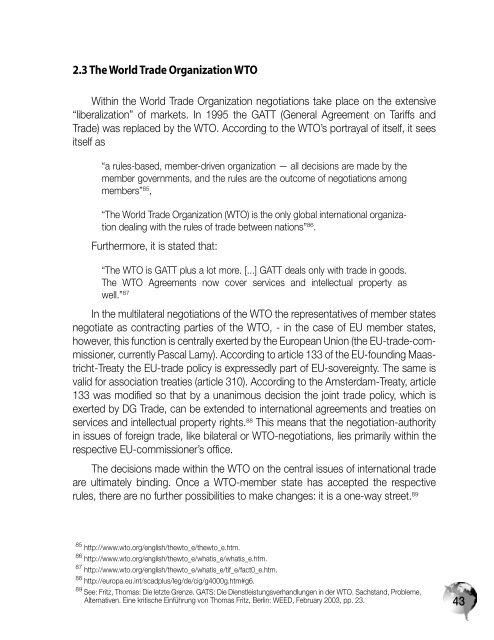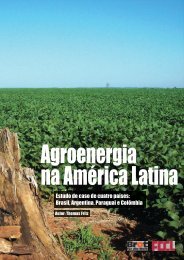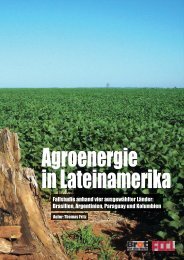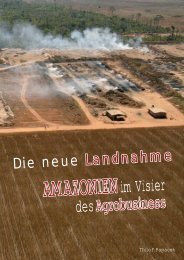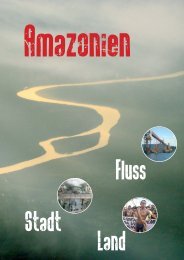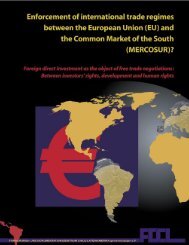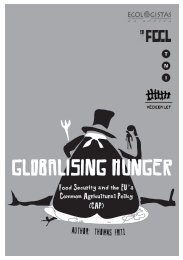Download - FDCL
Download - FDCL
Download - FDCL
Create successful ePaper yourself
Turn your PDF publications into a flip-book with our unique Google optimized e-Paper software.
2.3 The World Trade Organization WTO<br />
Within the World Trade Organization negotiations take place on the extensive<br />
“liberalization” of markets. In 1995 the GATT (General Agreement on Tariffs and<br />
Trade) was replaced by the WTO. According to the WTO’s portrayal of itself, it sees<br />
itself as<br />
“a rules-based, member-driven organization — all decisions are made by the<br />
member governments, and the rules are the outcome of negotiations among<br />
members” 85 ,<br />
“The World Trade Organization (WTO) is the only global international organization<br />
dealing with the rules of trade between nations” 86 .<br />
Furthermore, it is stated that:<br />
“The WTO is GATT plus a lot more. [...] GATT deals only with trade in goods.<br />
The WTO Agreements now cover services and intellectual property as<br />
well.” 87<br />
In the multilateral negotiations of the WTO the representatives of member states<br />
negotiate as contracting parties of the WTO, - in the case of EU member states,<br />
however, this function is centrally exerted by the European Union (the EU-trade-commissioner,<br />
currently Pascal Lamy). According to article 133 of the EU-founding Maastricht-Treaty<br />
the EU-trade policy is expressedly part of EU-sovereignty. The same is<br />
valid for association treaties (article 310). According to the Amsterdam-Treaty, article<br />
133 was modified so that by a unanimous decision the joint trade policy, which is<br />
exerted by DG Trade, can be extended to international agreements and treaties on<br />
services and intellectual property rights. 88 This means that the negotiation-authority<br />
in issues of foreign trade, like bilateral or WTO-negotiations, lies primarily within the<br />
respective EU-commissioner’s office.<br />
The decisions made within the WTO on the central issues of international trade<br />
are ultimately binding. Once a WTO-member state has accepted the respective<br />
rules, there are no further possibilities to make changes: it is a one-way street. 89<br />
85<br />
http://www.wto.org/english/thewto_e/thewto_e.htm.<br />
86<br />
http://www.wto.org/english/thewto_e/whatis_e/whatis_e.htm.<br />
87<br />
http://www.wto.org/english/thewto_e/whatis_e/tif_e/fact0_e.htm.<br />
88<br />
http://europa.eu.int/scadplus/leg/de/cig/g4000g.htm#g6.<br />
89<br />
See: Fritz, Thomas: Die letzte Grenze. GATS: Die Dienstleistungsverhandlungen in der WTO. Sachstand, Probleme,<br />
Alternativen. Eine kritische Einführung von Thomas Fritz, Berlin: WEED, February 2003, pp. 23.<br />
43


